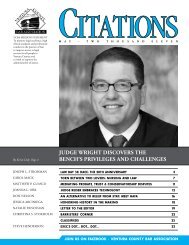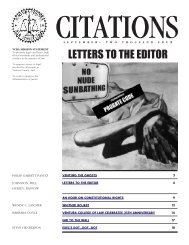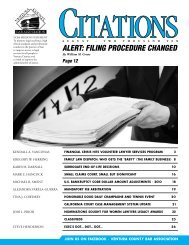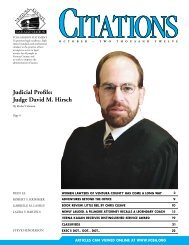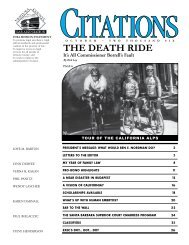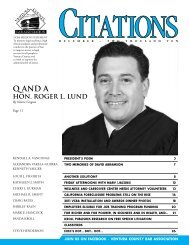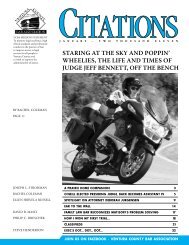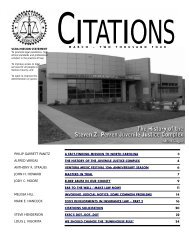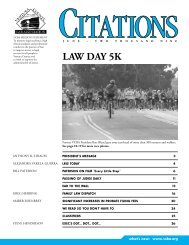Another Giant Departs - Ventura County Bar Association
Another Giant Departs - Ventura County Bar Association
Another Giant Departs - Ventura County Bar Association
Create successful ePaper yourself
Turn your PDF publications into a flip-book with our unique Google optimized e-Paper software.
20 CITATIONS • JANUARY 2009<br />
STAYS ON APPEAL<br />
By Wendy Cole Lascher<br />
Suppose a defendant has just been hit with a<br />
huge damages award or the court has imposed<br />
a hefty monthly support obligation? What if<br />
the court has ordered a losing party to pay the<br />
other side’s attorney fees, or ordered contested<br />
property be sold forthwith? Once the judgment<br />
is sufficiently final, the losing party can appeal.<br />
But no matter how good the legal issues are,<br />
an appeal may not help if the prevailing party<br />
collects the judgment and spends the proceeds<br />
while the loser is awaiting the appellate record<br />
or writing a brief.<br />
Automatic Stays Are Hard to Come By<br />
Most state court judgments are enforceable as<br />
soon as they are entered, and interest begins<br />
to accrue from the date of entry. Code Civ.<br />
Proc., §§ 683.010, 685.020. An exception<br />
is that judgments or orders permitting a child<br />
to be taken from the state are stayed briefly by<br />
operation of law. Id. at § 917.7. Filing a motion<br />
for a new trial or judgment notwithstanding the<br />
verdict does not stay enforcement. The trial<br />
judge does have discretion to grant a temporary<br />
stay, but for most judgments, this cannot last<br />
beyond 10 days after the last day to file a notice<br />
of appeal. Id. at § 918(b).<br />
In contrast, federal money judgments – as<br />
opposed to judgments imposing injunctions,<br />
receiverships, and patent accountings – are<br />
automatically stayed for 10 days after entry.<br />
Fed. R. Civ. P., Rule 62(a). After 10 days,<br />
the district judge may stay execution pending<br />
disposition of post-trial motions or completion<br />
of trial as to other parties. Id., Rule 62(b),<br />
(h). And, if the judgment acts as a lien on the<br />
debtor’s property – as it does in California when<br />
an abstract of judgment has been recorded or a<br />
notice of judgment lien on personal property<br />
has been filed with the Secretary of State (Code<br />
Civ. Proc., §§ 697.310, 697.510) – a federal<br />
judgment debtor is entitled to the same stay of<br />
execution the state court would give. Fed. R.<br />
Civ. P. 62(f).<br />
Code of Civil Procedure § 916 provides for<br />
an automatic stay of enforcement upon filing<br />
a notice of appeal, as well as for a stay of<br />
proceedings on matters “embraced in or affected<br />
by” the judgment or order that is the subject of<br />
the appeal. However, the exceptions spelled<br />
out in §§ 917.1 through 917.9 and § 116.810<br />
swallow large parts of the rule, so that many<br />
judgments are not stayed unless the appellant<br />
posts a bond to stay execution. For purposes<br />
of stays on appeal, the words “undertaking” and<br />
“bond” are interchangeable. Id. at §§ 995.210.<br />
This article will use “bond.”<br />
When Is A Bond Needed?<br />
Thus, although an appellant is free to appeal<br />
without posting a bond, he or she usually<br />
will not be safe from the respondent’s efforts<br />
to enforce a judgment without one. When a<br />
judgment is for money – including “nonroutine”<br />
costs under Code of Civil Procedure § 998<br />
(offers to compromise) or §1141.21 (trials de<br />
novo after arbitration) – filing an appeal does<br />
not stay execution unless the appellant posts<br />
a bond.<br />
The amount of the bond is one and a half<br />
times the judgment if the bond comes from an<br />
admitted surety insurer or the appellant posts<br />
cash, or two times the judgment if personal<br />
sureties are used. Id. at §§ 917.1, 995.710(b).<br />
Liability insurance often covers the posting of<br />
an appeal bond, at least as to the portion of the<br />
judgment within policy limits. See, Merritt v. J.<br />
A. Stafford Co. 68 Cal.2d 619 (1968).<br />
If the award of money is not a lump sum, but<br />
calls for monthly payments, as in the case of<br />
child or spousal support, the trial court must<br />
set the amount of the bond based on how<br />
long the appeal is likely to take and how much<br />
the appellant’s obligation would be for that<br />
period. Hogan v. Paddon, 91 Cal.App. 606,<br />
612 (1928).<br />
If the only monetary component of a judgment<br />
is for costs awarded under Code of Civil<br />
Procedure § 1021, et seq., no bond is needed<br />
to stay enforcement. Id. at §917.1(d). Attorney<br />
fees are considered costs for that purpose. Id. at<br />
§§1032, 1033.5(a)(10). Therefore, no bond is<br />
needed to stay enforcement of the award of fees<br />
when a defendant prevails and is awarded costs,<br />
or when the defendant pays the damages but<br />
appeals from an award of attorney fees. Ziello v.<br />
Superior Court, 75 Cal.App.4th 651, 652 (1999);<br />
but see Behniwal v. Mix, 147 Cal.App.4th 621,<br />
633-634 (2007) [holding that attorney fees<br />
awarded as part of specific performance are not<br />
“routine costs”]. However, the trial judge has<br />
discretion to require a bond to cover costs or fees.<br />
Code Civ. Proc., §917.9(a)(3). And a bond must<br />
be posted to stay execution of attorney fees and<br />
costs awarded to a defendant who prevails on<br />
an anti-SLAPP motion. Dowling v. Zimmerman,<br />
85 Cal.App.4th 1400, 1432 (2001).<br />
Bonds are also necessary to stay execution when<br />
a judgment directs assignment or delivery of<br />
personal property (Code Civ. Proc., § 917.2) or<br />
directs the sale, conveyance, or delivery of real<br />
property (§ 917.4) or when the court appoints<br />
a receiver (§ 917.5) or orders a right to attach<br />
property (§ 917.5).<br />
If the parties cannot agree on the amount in<br />
these circumstances, the appellant may apply to<br />
the trial court to set the amount of a bond. The<br />
stay created by Code of Civil Procedure § 916<br />
does not prevent the trial court from hearing<br />
motions relating to stays of execution. The<br />
motion should be supported by a declaration<br />
establishing the factors the court must consider<br />
in setting the amount. For example, if the<br />
bond were to secure monthly payments, the<br />
declaration would show how much is owed each<br />
month and how many months the appeal is<br />
likely to take; if it were to prevent the prevailing<br />
party from selling disputed real property, the<br />
declaration might show what the reasonable<br />
monthly rental value is for the expected duration<br />
of the appeal.<br />
The court does not have jurisdiction to refuse to<br />
set a bond where there is a statute providing for<br />
a stay upon posting a bond. Stevens v. Superior<br />
Court, 28 Cal.App.3d 1, 3 (1972).<br />
How Do You Get A Bond?<br />
Insurance companies write surety bonds. A<br />
party who needs a bond to stay execution may<br />
approach his or her own insurance agent, or<br />
directly contact one of the large companies<br />
that handle appeal bonds (most appellate<br />
lawyers have favorites with which they deal).<br />
The premium on an appeal bond is relatively<br />
low – often only 2-4 percent annually of the<br />
bond amount.<br />
But the problem many appellants face is not<br />
paying the premium, but obtaining the required<br />
collateral. Most surety companies require either<br />
cash or an irrevocable letter of credit as collateral.<br />
However, recently a client who obtained a letter<br />
of credit from a small local bank found that the<br />
sureties he approached would not accept it as<br />
collateral because the letter of credit did not<br />
come from a large national bank.<br />
Assuming collateral is available and the appellant<br />
wants to use a bond (although in light of the<br />
option of posting cash discussed below, there<br />
does not seem to be a good reason to pay a<br />
premium to an insurer rather than posting<br />
the cash as collateral), the process of bonding<br />
is simple. The insurance company will want<br />
to know some details about the case – party<br />
names, date judgment entered, how long the<br />
appeal is likely to take, for example. Once it is<br />
satisfied and the premium is paid, it will supply<br />
the bond.





